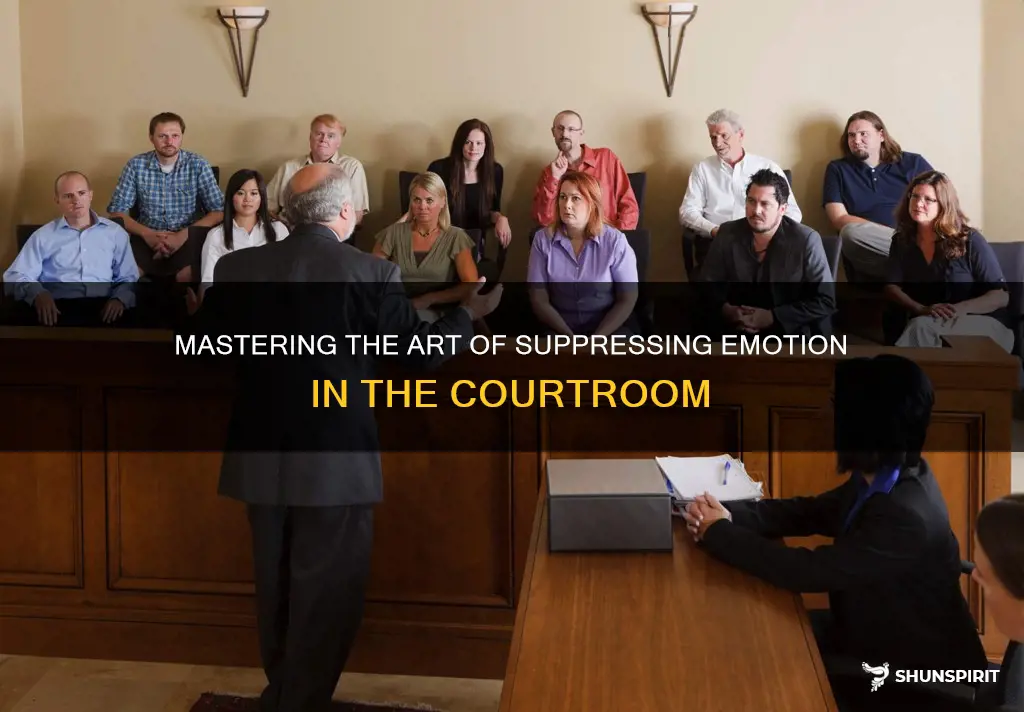
In the high-pressure environment of a courtroom, showing too much emotion can be detrimental to your case. Whether you're a witness, attorney or defendant, maintaining a composed and non-emotional demeanor is crucial to presenting a strong and persuasive argument. In this guide, we will explore various techniques and strategies to help you keep your emotions in check and navigate the courtroom with confidence and composure. So, if you're looking to master the art of not showing emotion in the courtroom, read on to discover valuable insights and practical tips that will undoubtedly contribute to your success.
| Characteristics | Values |
|---|---|
| Maintain a neutral facial expression | Poker face |
| Control body language | Avoid fidgeting or nervous ticks |
| Speak in a steady and calm tone | Avoid showing anger or irritation |
| Use logical and rational arguments | Avoid emotional outbursts |
| Maintain a professional demeanor | Avoid personal comments or attacks |
| Listen attentively and respectfully | Avoid interrupting or showing impatience |
| Maintain composure under pressure | Avoid becoming overwhelmed or flustered |
What You'll Learn

Tips for Controlling Your Emotions in the Courtroom
The courtroom can be an emotionally charged environment, and it's crucial to maintain control over your emotions to present a strong and composed demeanor. Whether you're a witness, attorney, or a party to the case, here are a few tips to help you stay calm and collected in the courtroom.
- Take deep breaths: One of the simplest and most effective ways to control your emotions in the courtroom is by taking deep breaths. When you feel your emotions building, take a moment to pause, inhale deeply through your nose, and exhale slowly through your mouth. This deep breathing technique can help reduce stress and anxiety, allowing you to think more clearly and react calmly to the situation.
- Maintain a neutral facial expression: It's essential to keep a neutral facial expression throughout the proceedings. Displaying emotions on your face, such as anger or frustration, can undermine your credibility and potentially influence the judge or jury's perception of you. Even if faced with challenging questions or unfavorable outcomes, try to keep your facial expression composed and neutral. Take a moment to collect yourself internally and respond calmly and professionally.
- Keep your body language composed: In addition to maintaining a neutral facial expression, it's equally important to control your body language in the courtroom. Avoid fidgeting, crossing your arms, or displaying defensive postures, as these actions can convey nervousness or defensiveness. Instead, focus on sitting or standing upright, with relaxed but purposeful movements. Projecting confidence and composure through your body language will help you appear more credible and in control.
- Use positive self-talk: Another helpful technique for controlling your emotions in the courtroom is to engage in positive self-talk. This involves replacing negative or self-doubting thoughts with positive and empowering statements. Remind yourself of your strengths, experience, and preparedness. Encourage yourself with affirmations such as "I am confident and capable," "I have done my research and preparation," or "I am composed and in control." Positive self-talk can help boost your confidence and counteract any negativity or self-doubt that may arise during the proceedings.
Controlling your emotions in the courtroom is crucial for maintaining professionalism, credibility, and composure. By practicing deep breathing, maintaining a neutral facial expression and composed body language, and engaging in positive self-talk, you can better manage your emotions and present your case or testimony with confidence. Remember to stay focused, prepared, and centered throughout the proceedings, and allow yourself moments of self-care and reflection to decompress and recharge.
Identifying Emotional Abuse: Could My Brother Be Emotionally Abusive?
You may want to see also

Strategies to Prevent Emotional Reactions in Court
When appearing in court, it is essential to maintain emotional composure and avoid emotional reactions that could impact your case. Emotions can cloud judgment, hinder clear communication, and even negatively influence a judge or jury's perception of your credibility. To prevent emotional reactions in court, there are several effective strategies you can employ. By practicing mindfulness techniques, engaging in meditation, mindful breathing exercises, grounding techniques, seeking professional support through therapy or counseling, practicing stress management techniques, developing coping mechanisms, journaling, engaging in physical exercise, and participating in hobbies or activities, you can successfully navigate the courtroom with composure and poise.
Practice mindfulness techniques:
Mindfulness involves staying present in the moment and paying attention to your thoughts, feelings, and sensations without judgment. Regular practice of mindfulness techniques can help you become more aware of your emotions and better equipped to manage them effectively.
Engage in meditation:
Meditation is a powerful tool that can calm the mind and reduce stress. Dedicate some time each day to meditation, focusing on deep breathing and relaxation techniques. This practice can enhance your ability to stay calm and composed during court proceedings.
Utilize mindful breathing exercises:
Taking a few deep, deliberate breaths can help regulate your emotions and return your focus to the present moment. Practice this technique whenever you feel yourself becoming overwhelmed or anxious in court.
Employ grounding techniques:
Grounding exercises involve focusing on the here and now by using your senses. For example, you can concentrate on the feeling of your feet on the floor, the texture of an object in your hand, or the sound of your own breathing. Grounding techniques can help reduce anxiety and bring your attention back to the present.
Seek professional support:
If you find it challenging to manage your emotions in a legal setting, consider seeking professional support through therapy or counseling. A mental health professional can provide you with coping strategies, help you process your emotions, and offer guidance tailored to your specific situation.
Practice stress management techniques:
Managing stress is crucial in preventing emotional reactions in court. Engage in stress-reducing activities such as deep breathing exercises, progressive muscle relaxation, or guided imagery. Find what works best for you and incorporate it into your daily routine.
Develop coping mechanisms:
Identify healthy coping mechanisms that work for you outside of the courtroom. Whether it's spending time with loved ones, enjoying a hobby, or engaging in physical exercise, having healthy outlets for stress and emotions can significantly contribute to emotional regulation in court.
Journaling:
Keeping a journal can help you process your thoughts and emotions concerning your legal case. Writing down your feelings and concerns can provide a sense of relief and clarity. It can also assist you in identifying patterns of behavior or triggers that might lead to emotional reactions in court.
Engaging in physical exercise:
Physical activity is an excellent way to release tension, reduce stress, and promote emotional well-being. Incorporate regular exercise into your routine, whether it's going for a run, practicing yoga, or participating in a sport. Physical exercise can help you feel more centered and grounded.
Participating in hobbies or activities:
Engaging in activities you enjoy can serve as a healthy distraction and help you relax and unwind. Whether it's painting, playing a musical instrument, reading, or spending time in nature, find activities that bring you joy and make time to incorporate them into your schedule.
Remember, emotional reactions in court can be detrimental to your case. By adopting these strategies and practicing emotional regulation techniques, you can navigate the courtroom with confidence and composure. Always consult with your attorney and follow their guidance throughout the legal process.
The Impact of Age on Emotional Intelligence: Exploring the Connection
You may want to see also

Ways to Handle Emotional Triggers in the Courtroom
Handling emotional triggers in the courtroom can be a challenging task. The pressure, intensity, and high stakes involved in legal proceedings can easily lead to emotional reactions that may impact case outcomes. Mastering the ability to identify, prepare for, and handle emotional triggers effectively is crucial for maintaining composure, presenting a strong case, and achieving the best possible results. In this article, we will explore four key strategies to help lawyers and litigants handle emotional triggers in the courtroom successfully.
Identify your triggers:
The first step in managing emotional triggers is to identify what specifically triggers your emotional response. Take a moment to reflect on past experiences and situations that have caused emotional reactions. Whether it's a particular line of questioning, a specific argument from opposing counsel, or a certain witness testimony, recognizing what triggers you will enable you to better prepare for and manage those situations.
Prepare in advance for potential triggers:
Once you have identified your triggers, it's essential to prepare yourself in advance for their potential occurrence. Anticipate situations that are likely to provoke an emotional response and develop a plan for how you will handle them. This may involve rehearsing responses, considering alternative viewpoints, or seeking support from colleagues or mentors. By proactively preparing for potential triggers, you are better equipped to maintain control and composure during moments of emotional intensity.
Have a plan for how to handle emotional moments:
Even with the most robust pre-trial preparation, emotional moments can still arise unexpectedly during courtroom proceedings. It's crucial to have a plan in place for how you will handle these moments when they occur. One effective strategy is to take a brief pause to collect your thoughts and regain control of your emotions. This can involve taking a deep breath, mentally reminding yourself of your objective, or employing relaxation techniques such as mindfulness or visualization. Additionally, having a support system in place, such as a trusted colleague or a mental health professional, can provide valuable guidance and assistance during challenging emotional moments.
Focus on the facts and evidence presented:
When facing emotional triggers in the courtroom, it's essential to redirect your focus to the facts and evidence of the case. By grounding yourself in objective information, you can distance yourself from emotional distractions and maintain an objective approach. Remind yourself of the critical arguments, testimonies, and legal principles that support your case. This will not only help you stay composed but also enable you to present a compelling and persuasive argument to the judge or jury.
In conclusion, handling emotional triggers in the courtroom requires self-awareness, preparation, and effective coping strategies. By identifying your triggers, preparing in advance, having a plan for emotional moments, and focusing on the facts and evidence, you can navigate emotional challenges successfully and achieve optimal outcomes in your cases. Remember, being emotionally resilient is a skill that can be developed over time with practice and self-reflection.
Recognizing the Signs of an Emotionally Abusive Relationship
You may want to see also

The Importance of Emotional Control in Courtroom Settings
In any courtroom setting, emotional control is of utmost importance. It plays a crucial role in maintaining credibility and professionalism, ensuring fair and unbiased proceedings, effectively advocating for your case, and building a strong and persuasive courtroom presence. Emotions can easily escalate in high-stakes legal situations, but keeping them in check is essential for a successful outcome. Here's why emotional control matters in the courtroom and how you can master it.
Maintaining credibility and professionalism:
A lawyer's credibility and professionalism heavily rely on their ability to display emotional control in the courtroom. Judges, juries, and even opposing counsel pay close attention to the demeanor and behavior of attorneys. When you can maintain a calm and composed demeanor despite the pressure, you come across as confident, knowledgeable, and trustworthy. This helps to build your credibility as a legal professional and enhances your chances of success.
To maintain emotional control in the courtroom, start by preparing extensively for the trial. Thorough preparation will boost your confidence, making it easier to stay composed. Additionally, practice deep breathing exercises and mindfulness techniques to regulate your emotions during high-intensity moments. Remember to also maintain a professional tone when addressing the court, and avoid becoming defensive or confrontational.
Ensuring fair and unbiased proceedings:
Emotional control is vital for ensuring fair and unbiased court proceedings. As an attorney, it is your duty to present your case persuasively while also respecting the rights of the opposing party. Uncontrolled emotions can cloud your judgment, leading to biased arguments or unfair treatment of witnesses.
To ensure fair proceedings, actively listen to opposing arguments without interruption, allowing the court to make an informed decision. When emotions arise, take a moment to gather your thoughts and respond in a calm and measured manner. Remember that maintaining emotional control will not only promote fairness but also demonstrate your professionalism and respect for the legal process.
Effectively advocating for your case:
Emotional control is essential for effectively advocating for your case. A courtroom can be an emotionally charged environment, and it's natural for attorneys to feel passionate about their clients' causes. However, displaying uncontrolled emotions can hinder your ability to present persuasive arguments and convince the court of your position.
To advocate effectively, focus on building logical and well-supported arguments. Present your case with a clear and concise manner, supported by facts, evidence, and legal precedents. Practice active listening to understand the opposing party's perspective and respond thoughtfully. By exhibiting emotional control, you are more likely to convey your message convincingly, increasing the chances of a favorable outcome.
Building a strong and persuasive courtroom presence:
A strong and persuasive courtroom presence is crucial for winning cases. Mastering emotional control allows you to project confidence, authority, and credibility in the courtroom. It helps you maintain focus and clarity, enabling you to address the court effectively and respond to unexpected challenges.
To build a strong presence, practice maintaining eye contact, using confident body language, and speaking clearly and assertively. Work on developing a confident tone without sounding arrogant or overly aggressive. By exhibiting emotional control, you can effectively command the attention of the court and present your case with conviction, increasing your chances of success.
In conclusion, emotional control is vital for every lawyer in a courtroom setting. By maintaining emotional control, you can enhance your credibility and professionalism, ensure fair and unbiased proceedings, effectively advocate for your case, and build a strong and persuasive courtroom presence. Remember that mastering emotional control takes practice and self-awareness. By continuously honing this skill, you can increase your effectiveness as a lawyer and maximize your chances of success in the courtroom.
Finding Healing and Liberation: The Journey After Leaving an Emotionally Abusive Relationship
You may want to see also
Frequently asked questions
One way to prevent yourself from showing emotion in the courtroom is to stay focused on the facts and evidence of the case. Remind yourself that emotions can cloud judgment and influence the perception of the jury. Practice maintaining a neutral facial expression and body language during the proceedings.
Controlling emotions during a difficult testimony can be challenging but not impossible. Take deep breaths and try to relax your body. Focus on grounding techniques, such as pressing your feet firmly into the ground or grasping an object tightly. Additionally, remind yourself that showing emotion may not be advantageous to your case and could affect the perception of the jury.
It is important to identify and prepare for emotional triggers that may arise in the courtroom. Before the trial, discuss these triggers with your attorney and develop strategies for managing them. For example, if certain topics evoke strong emotions, practice techniques such as visualization or positive self-talk to help maintain composure.
If you feel overwhelmed with emotion during a trial, it's important to take a brief pause to collect yourself. Request a quick recess from the judge if necessary. During the break, find a private space to engage in deep breathing exercises or other calming techniques. Utilize the support of your attorney or a trusted colleague to help you regain composure before returning to the courtroom.







